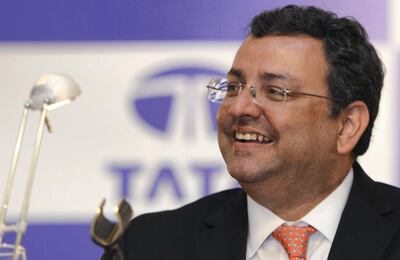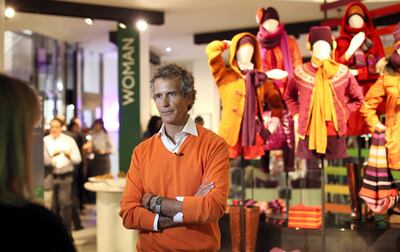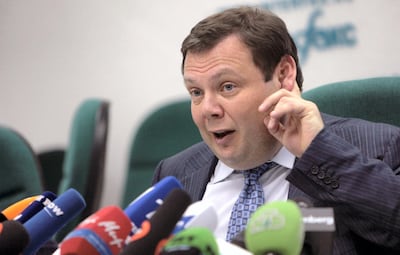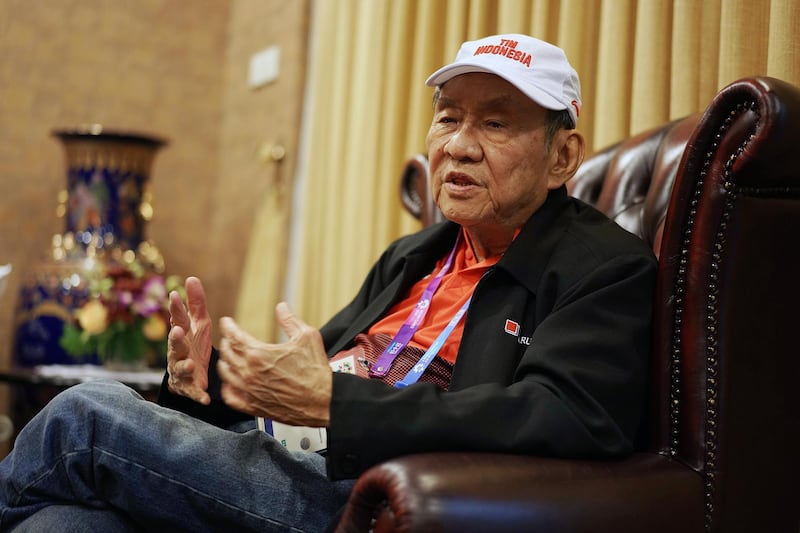Michael Bambang Hartono
For Michael Bambang Hartono, a professional bridge player, the risk-taking and quick decision-making skills required in the game were instrumental in amassing his $11.5 billion fortune.
Now the 78-year-old tycoon, whose family fortune spans from tobacco to banking and telecom, is bidding to become Indonesia’s oldest Asian Games medal winner should he make the finals. He’s pairing with 65-year-old Bert Toar Polii as bridge makes its debut in the ongoing Asian Games in Jakarta.
“Bridge is how you train yourself in making good decisions and risk-taking,” Mr Hartono, who took to the game as a young boy, said at Jakarta’s main venue for the Games. “You know what per cent is the risk you take and the strategy. Bridge is a team game, you cannot depend on yourself alone. I work always in a team and am used to it.”
Mr Hartono teamed up with his younger brother Robert Budi Hartono and took calculated risks to grow their empire, the Djarum Group. The conglomerate is among the top cigarette makers in Indonesia and also owns majority stakes in Bank Central Asia and Sarana Menara Nusantara. The younger Hartono is ranked as the richest Indonesian with a net worth of $12.2bn, according to Bloomberg Billionaires Index.
Although Mr Hartono’s passion for bridge has taken him to several international competitions, winning a medal at Asia’s biggest sporting event is more prestigious than any other as Indonesia is hosting the event, he said.
“There are 45 countries competing now and the game is held every four years,” said Mr Hartono, who is part of Indonesia’s super-mixed bridge team. “If every country wants to be a host, it will take 180 years for the game to return to Indonesia. That’s how important winning is.”
With bridge, a game of cards in which players rely on tactics and risk-taking rather than the physical superiority required in most outdoor games, there are older players than Mr Hartono. Kong Te Yang, an 85-year-old Filipino is the oldest participant followed by Lai Chun Ng, an 82-year-old Singaporean.
Mr Hartono’s introduction to bridge came early in life and he has since pursued it with passion.
“It was during Japanese occupation, in 1944 or 1945. I would watch my uncle play bridge after school. He lived next door,’’ he said. “One day, one of the uncle’s friends could not come. So my uncle told me, ‘Sit down and play.’ That’s how it all began.’’
Mr Hartono says his dream is to see it included in the Olympics. With computer game competitions, or esports, being considered for the 2024 Paris Olympics, bridge may just be able to make a case for itself.
For the time being, the billionaire is focused on winning the Asian Games medal after he failed to win the final at this year’s Summer North American Bridge Championships in Atlanta.
“I drank wine during dinner just before the final, then fell asleep. My partner was mad. He woke me up 10 times, I think, and also my opponent,’’ Mr Hartono said. “I lost a gold medal because of that! In the final! So no more wine.’’
The Asian Games will run through September 2 with the bridge super-mixed team finals scheduled for August 27.
Pallonji Mistry
Billionaire Pallonji Mistry has about 85 per cent of his estimated $19.9bn fortune locked up in a legal battle with India’s largest conglomerate.
The conflict between Mr Mistry and the Tata Group began with a boardroom coup in 2016, when the former’s son was ousted as chairman of the latter. The 89-year-old Mr Mistry is one of the largest shareholders in Tata Sons, which controls the $100bn conglomerate, and his family has since filed numerous lawsuits against the holding company’s board, alleging suppression of minority interests and governance lapses.

The courtroom battle has continued, most recently focused on a move by Tata Sons to restrict shareholders from freely selling their stake - a change recognized by the government this month. Mr Mistry, who derives an estimated $16.9bn of his fortune from his 18.4 per cent equity in Tata Sons, can no longer sell those holdings without the approval of a board his family has been fighting for two years.
Mr Mistry’s Shapoorji Pallonji group didn’t reply to an email seeking comment. A Tata Sons spokesman declined to comment.
While Tata Sons has always been a closely held private entity, it was considered a public limited company due to its size under an old legal provision. That allowed investors greater flexibility in transferring their shares, according to Daizy Chawla, a New Delhi-based senior partner at law firm Singh & Associates.
The law was altered some years back, allowing Tata Sons’s shareholders to approve a change to its legal status last year, overriding objections from Mr Mistry’s son.
“Being a private company there is now restriction on the free transfer of shares by its shareholder and the transfer needs to be done with the approval of the board of directors,” Ms Chawla said.
A New Delhi court this month heard arguments on a plea to put on hold government approval of Tata Sons’ conversion. The dispute may eventually wend its way to India’s top court since the losing party will have the right to appeal.
The discord has battered a relationship that goes back almost a century. A Mistry company had financial links with Tata Sons from as early as 1927, although the family only began acquiring equity from the 1960s onward. Over time, purchases from Tata family members and a rights issue grew their holding to the present 18.4 per cent.
Mr Mistry inherited the stake from his father, who built the Tata Group’s automobile factories and steel mills. His Shapoorji Pallonji group, founded in 1865, is also responsible for some of financial capital Mumbai’s most iconic structures including the Reserve Bank of India buildings and The Taj Mahal Palace hotel.
_______________
Read more:
Billionaire art lover is looking to make a historic sale
Fortnite craze makes game designer a billionaire
_______________
After earning a reputation for being reclusive, Mr Mistry and his family were thrust into the spotlight in 2012, when his younger son was chosen to helm the Tata group. The bonhomie ended with his son’s ousting in October 2016, which triggered one of India’s worst corporate showdowns.
Still, it’s the exposure to Tata companies that’s helped bump up Pallonji Mistry’s fortune by $2.5bn this year as investors piled into Tata Consultancy Services, Asia’s largest software services provider. Mr Mistry ranks 44th on the Bloomberg Billionaires Index and is among the richest men living in India.
Another point of contention that’s emerged as the Tata-Mistry relationship soured is article 75 of Tata Sons’s articles of association, which the board can use to force a shareholder to sell out. This provision is also being contested in court.
Combined with the decision to go private, the restriction puts Mr Mistry in a tight spot. On the one hand, he can be forced to sell his stake while, on the other, he needs Tata Sons to sign off on a suitor he picks.
“Tata Sons can choose to preempt any stake sale by enforcing article 75 in its articles of association and forcing an existing shareholder to sell out,” said Sudip Mahapatra, a partner at law firm S&R Associates. “That’s what’s putting the Mistry family on a weak footing.”
Benetton family
Fallout from the Genoa bridge disaster has erased about $2bn of net worth from one of Italy’s richest families.
The billionaire Benettons control 30.25 per cent of Atlantia, the construction company and toll-road owner that operated the Morandi Bridge that collapsed this month, killing at least 43 people. The Atlantia stake is their single-largest asset, comprising more than a third of their $13.3bn fortune, according to the Bloomberg Billionaires Index.

A spokesman for the Benetton family holding company declined to comment.
The Rome-based builder’s stock has plummeted 26 per cent to a four-year low in the wake of the tragedy as the government moves to start the process of ending the company’s concession. The family has offered aid to help victims of the disaster and support the repair of severed transit links while Atlantia’s toll-road division, Autostrade per l’Italia, has set up an initial $574 million fund for victim compensation and reconstruction.
The family’s flagship fashion retailer, which originated from a single knitwear store founded by siblings Luciano, Gilberto, Giuliana and the late Carlo in the 1950s, is now one of about of a dozen assets owned by the family’s investment company, Edizione Holding.
Including Atlantia, the family controls $9.3bn worth of shares in publicly traded companies, including 3 per cent of Assicurazioni Generali and 29.9 per cent of Spain’s Cellnex Telecom. They also own closely held assets including Argentinean farmland and the Treviso rugby team.
Their broad portfolio has helped them accumulate one of the biggest personal fortunes in Italy. Only a small handful of families and individuals, including the chocolate-making Ferreros, Luxottica Group founder Leonardo del Vecchio and Walgreens Boots Alliance chief executive Stefano Pessina, are wealthier.
German Khan, Mikhal Fridman and Petr Aven
For these three ultra-wealthy businessmen, a recent court decision may well have put their noses out of joint.
Former British spy Christopher Steele defeated a defamation lawsuit brought by the billionaire owners of Moscow-based Alfa-Bank over the dossier Steele compiled that examined then-presidential candidate Donald Trump’s ties to Russia and Vladimir Putin.
A District of Columbia Superior Court judge on Monday dismissed the lawsuit brought by German Khan, Mikhail Fridman and Petr Aven, agreeing with Mr Steele that his report serves the public interest because it relates to possible Russian influence with the 2016 presidential election and Russian oligarchs’ involvement with the Russian government. In addition, plaintiffs didn’t provide evidence that Mr Steele acted with malice, the judge said.

According to the Bloomberg Billionaires Index, Ukranian national Mr Khan is worth $9.14bn, Russia-born Mr Freidman is worth $13.4bn and his fellow countryman Mr Aven's fortune is $5.88bn.
Superior Court Judge Anthony Epstein didn’t address whether the information in the Steele dossier was accurate, only whether Mr Steele’s sharing of the report with the media was protected by the First Amendment of the US Constitution.
"The US public today continues to have a strong interest in Russia’s relations with the United States and in the political and commercial relationships between Russian oligarchs and the Russian government," Judge Epstein said in his ruling.
Mr Steele, who President Donald Trump has called a “lowlife”, was retained by a Washington-based research firm, Fusion GPS, in June 2016 to examine Mr Trump’s links to Russia, according to the ruling. Fusion had first been hired by Republicans during the primaries for the 2016 election. The Democratic National Committee and the campaign of Hillary Clinton hired Fusion after Mr Trump was headed for the nomination.
Alfa-Bank’s owners sued Mr Steele over claims in his report that the bank had a close relationship with Mr Putin, that “significant favours” were done in both directions and that an intermediary delivered “illicit cash” to Mr Putin throughout the 1990s when he was deputy mayor of St Petersburg.
“We strongly disagree with the court’s decision, which we will almost certainly appeal," Alan Lewis, a lawyer representing the bankers, said in a statement.
"We are, however, pleased that the court agreed that we have adequately proved Mr Steele’s negligence in making unsupported accusations that our clients had something to do with alleged efforts to interfere in the 2016 election - which they did not."






